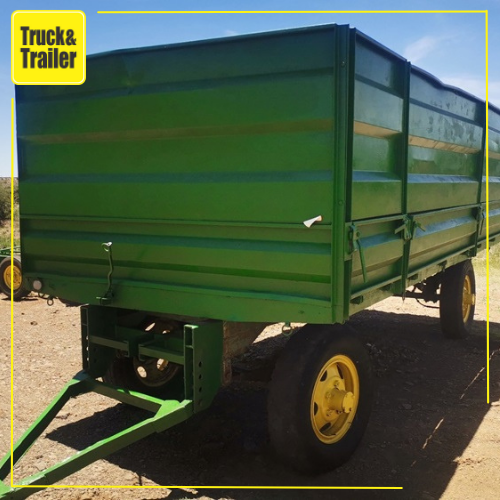
Essential Maintenance Tips for Agricultural Trailers in South Africa
Date: 21/12/2023
Maintenance is the cornerstone of ensuring the longevity and efficiency of farming equipment. Among these, agricultural trailers play a crucial role in transporting produce, equipment, and materials across farms in South Africa. Neglecting maintenance can lead to breakdowns, delays, and unnecessary expenses. Therefore, implementing regular maintenance practices is essential for farmers to maximise the lifespan and functionality of their trailers. In this article, we'll explore some essential maintenance tips for agricultural trailers specifically tailored to them. Visit Truck & Trailer to view our hiring section for all your truck, trailer, and plant needs. To view, click this link.

Maintenance Tips for Agricultural Trailers
1. Regular Inspection and Cleaning:
Regular inspections are fundamental for identifying potential issues before they escalate into costly problems. Farmers should inspect their trailers thoroughly, paying attention to structural integrity, tyres, lights, brakes, and hydraulic systems. Cleaning is equally important, as dirt, debris, and residue can accelerate wear and tear. Use appropriate cleaning agents to remove dirt and corrosive substances, especially after transporting chemicals or fertilisers.
2. Lubrication:
Proper lubrication is vital for reducing friction and preventing premature wear of moving parts such as axles, bearings, hinges, and hydraulic cylinders. Use high-quality lubricants recommended by the manufacturer and adhere to the specified lubrication intervals. Pay close attention to greasing points and ensure adequate coverage to maintain optimal performance.
3. Tyre Maintenance:
Tyres are critical components of agricultural trailers, bearing the weight of heavy loads and enduring various terrains. Regularly check tyre pressure to prevent underinflation or overinflation, which can affect stability and fuel efficiency. Inspect tyres for signs of wear, cuts, or punctures, and replace them when necessary. Proper alignment and rotation can also extend tire life and ensure even wear patterns.
4. Brake System Inspection:
These type of trailers often carry substantial loads, making a reliable brake system imperative for safe operation. Inspect brake pads, drums, and hydraulic lines regularly for signs of wear, leaks, or damage. Ensure that brakes are properly adjusted to provide adequate stopping power without excessive drag. Replace worn components and address any issues promptly to maintain optimal braking performance.
5. Electrical System Checks:
Functional lighting and electrical systems are essential for safety and compliance with road regulations. Regularly inspect all lights, including brake lights, turn signals, and reflectors, to ensure they are clean and operational. Check wiring harnesses for damage or corrosion, and replace any faulty components promptly. Properly functioning electrical systems enhance visibility and reduce the risk of accidents, especially during low-light conditions.
6. Rust Prevention and Corrosion Control:
Agricultural trailers are exposed to various environmental elements that can accelerate corrosion, especially in coastal regions or areas with high humidity. Implement rust prevention measures such as applying rust-resistant coatings, keeping the trailer clean and dry, and storing it in a sheltered area when not in use. Inspect the trailer regularly for signs of rust or corrosion, particularly in vulnerable areas such as joints, welds, and exposed metal surfaces.

Why Regular Inspections are Necessary
Regular inspections of your agricultural trailer help identify potential issues before they become major problems. The following explains why it is necessary to ensure regular maintenance takes place.
1. Monthly Inspections
Carrying out monthly inspections on your trailer is a good rule of thumb. During these inspections, thoroughly check the following components:
a. Tyres: Ensure the tyre pressure is correct and check for signs of wear or damage. Replace any worn-out or damaged tires promptly.
b. Lights and wiring: Test all lights, including taillights, brake lights, and indicators. Verify that the wiring is intact and secure.
c. Brakes: Inspect the braking system for wear. Check brake pads, drums, and hydraulic lines for signs of damage or leaks. Engage a professional if any abnormalities are detected.
d. Suspension: Examine the suspension system for any signs of wear or loose connections. Ensure the suspension is operating smoothly to prevent damage to the trailer.
e. Coupling and hitch: Inspect the coupling and hitch mechanism to confirm they are functioning properly. Any issues should be addressed immediately to avoid accidents.
2. Pre-Season Inspection
Before the busy farming season starts, it is crucial to perform a comprehensive inspection of your agricultural trailer. This annual inspection should include:
a. Frame and body: Check for any signs of corrosion, cracks, or dents on the trailer's frame and body. Address any issues promptly to prevent further damage.
b. Wheel bearings: Inspect and repack wheel bearings annually to ensure they are lubricated correctly. Replace any damaged bearings to maintain optimal functionality.
c. Brake fluid: Check the level and condition of the brake fluid. Consult your trailer's manual for specific recommendations on when to change it.
d. Electrical system: Test the entire electrical system, including connectors and control units. Repair or replace any faulty components to maintain safe and reliable trailer operations.
e. Safety measures: Verify the presence and functionality of safety features such as reflectors, reflective tape, and emergency breakaway systems. Replace or repair any faulty equipment before the farming season begins.
To sum up, the maintenance tips for agricultural trailers outlined above serve as crucial guidelines for ensuring the longevity, safety, and efficiency of agricultural trailers. Regular inspections, cleaning, lubrication, tyre maintenance, brake system checks, electrical system inspections, and rust prevention measures are essential practices that help farmers avoid costly repairs, downtime, and safety hazards. By prioritising maintenance and adhering to these recommendations, farmers can maximise the lifespan and performance of their trailers, ultimately enhancing farm productivity and profitability. Therefore, it is imperative for farmers to incorporate these maintenance practices into their routine operations to keep them in optimal condition, ready to meet the demands of the farming season. For all truck, trailer, and plant rental needs, Truck & Trailer offers comprehensive hiring options. Visit our hiring page to explore our services further.







